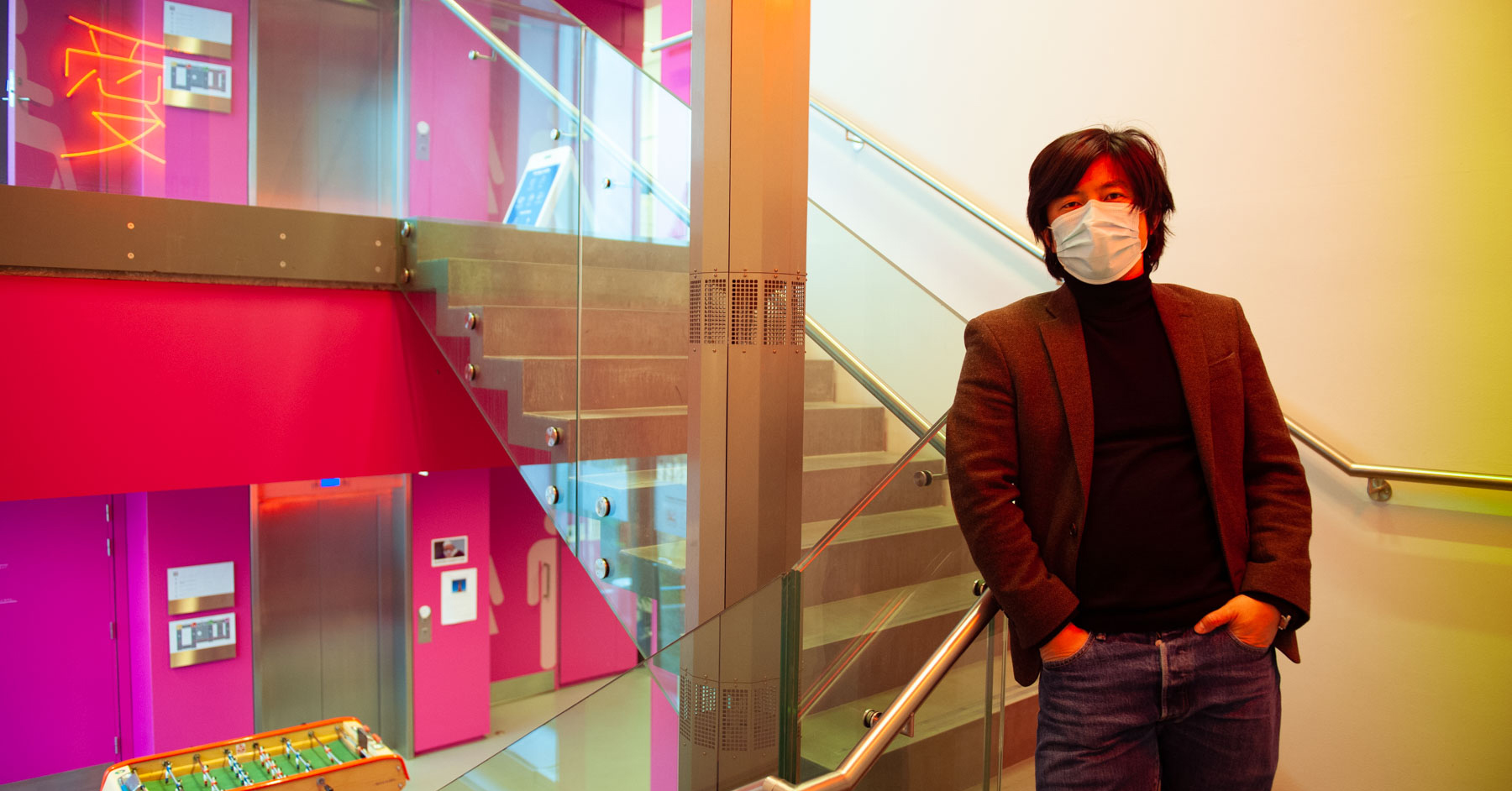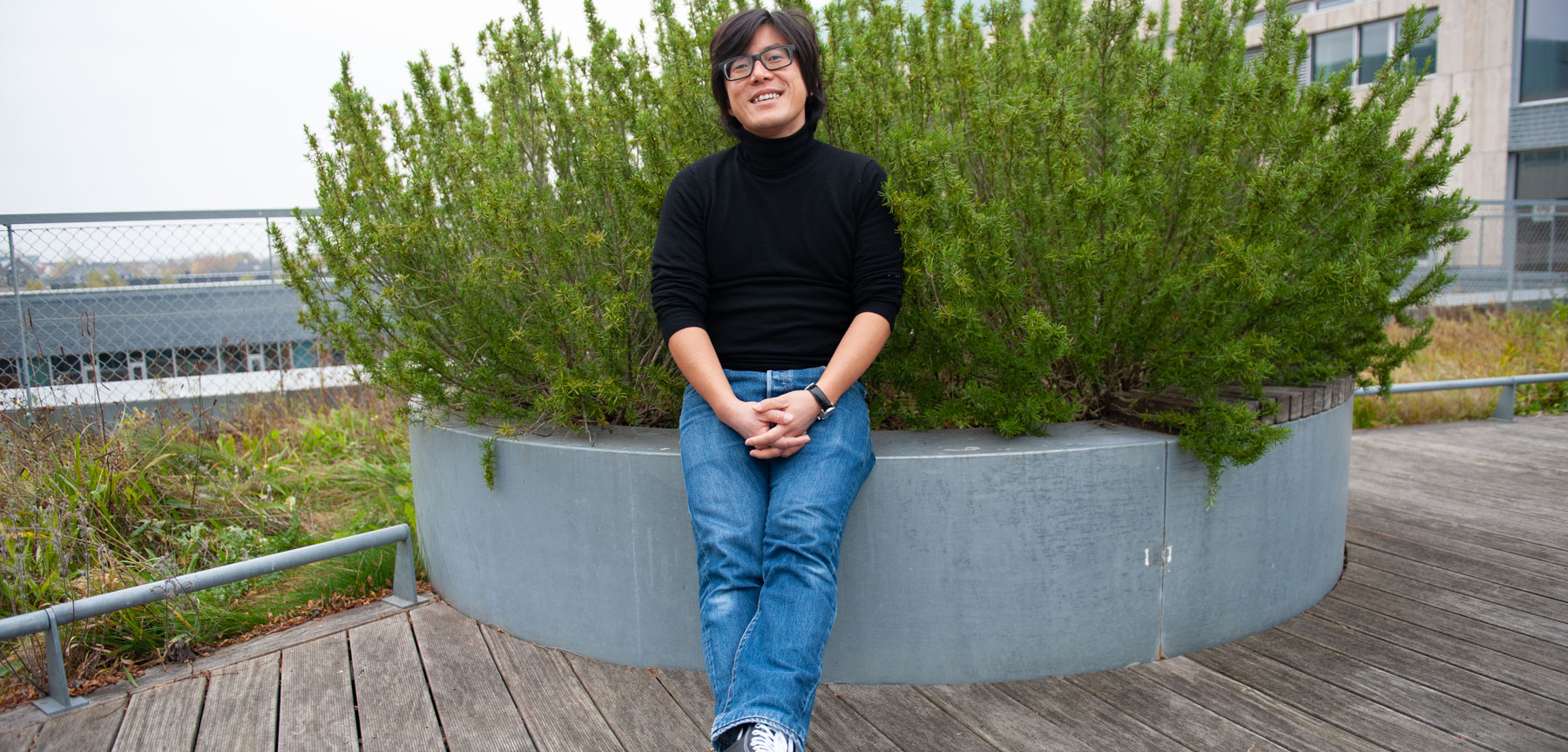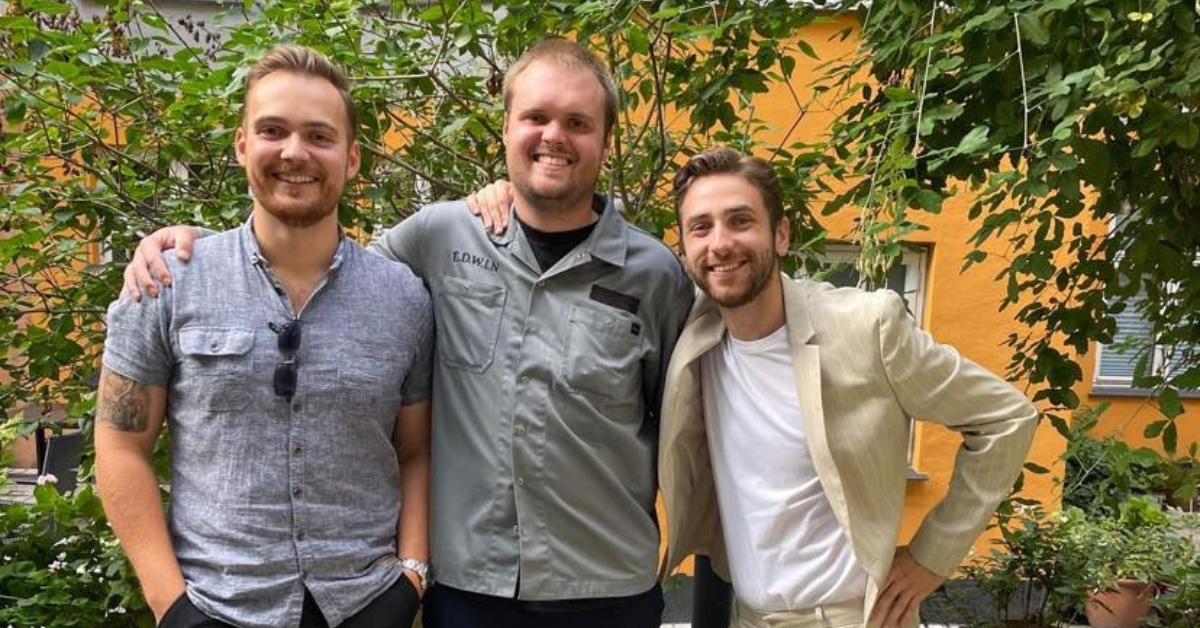Studieliv
Jeg er Victoria, jurastuderende på sidste semester af kandidaten ved Københavns Universitet og skriver pt. speciale i AI-faget om jura, XR (”extended reality”) og skade. Mit specialiseringsområde inden for jura er legal tech og AI. Jeg elsker fremtidsorienterede og nytænkende individer og institutioner.
Jeg valgte at interviewe Hin-Yan Liu, fordi han er en meget original professor, der elsker at prøve forskellige tilgange af ifm. undervisningen og at diskutere emner, der er relevante for AI og menneskeheden, men stadig er så ukendte at de netop blot liiige kan anskues på fremtidens horisonter. Dette er fx AI og existential risks, international relations, human rights, autonomous weapons systems, neural interfaces og robotics.
Og så fordi faget er et tech-fag, så forventer man måske en masse computere og gadgets, men Hin-Yan har valgt at køre faget kun med pen og papir for de studerendes vedkommende, hvilket var første gang jeg nogensinde havde set det på studiet (hint: man vænner sig til det). Hans energiske diskussioner, maniske skriverier på tavlen, originale artikler og enorme litterære viden efterlod altid de studerende nysgerrige – jeg kan huske at vi ofte blev på KUA efter seminarerne for at diskutere videre med hinanden!
I sit down in the colorful office full of large plants, souvenir trinkets and climbing equipment and start the memo app on my iPhone.
“Okay. This is the interview for Karnov Kaius, their new digital universe for law students, it was made this year in 2020. It's made by students and for students. There are gonna be a lot of relevant articles for law school and study life and tips and tricks. So, thank you for your time. Thank you for being here.
You have been nominated for the teacher/professor of the year, which is also a very cool thing – not many people get to be that.”
“Yeah, I was a bit surprised myself. But yeah.” Hin-Yan replies.
“How did you get nominated for ‘Teacher of the Year’ at University of Copenhagen?” I curiously ask.
Hin-Yan happily answers: “From strong recommendations by my students. The students from my last class were very impressed about how interactive and engaging my course was; how they were pushed to approach familiar issues from new vantage points, and how openly and intensely we discussed topics of pressing societal concern.
My nomination by the students included comments like “His passion for the subject (artificial intelligence and legal disruption) and brilliance is obvious, and transmits to the entire class”, and “Hin-Yan manages to engage both me and the students in such a way that you'll walk away from a class and have even more to discuss and think about”. I was super happy to make such an impact on my students!
When I left campus after class, I would see small groups of my students vigorously discussing the topics from class – this is when I know I’ve done my job properly!
“All right, that’s brilliant. How did you become a professor?” I ask, interested in knowing more. Hin-Yan ponders for a moment.
“I was born for the academic life. I was always buried my books as a kid, and constantly writing ideas in my notebooks. The question really was which field I would devote myself. There was a year at school when I got the top mark in physics, with something like a 25% lead on the next kid in class which earned me the nickname of ‘The Physicist’. But that didn’t stick, as I was interested in human behaviour and I was better with words than numbers. I thought about a career as a research psychologist, but it turned out that the kinds of empirical studies that could be conducted did not really draw me in as much as learning about them.I took a different tack and went into the law, and quickly confirmed that I was not going to be a very good lawyer, because you need a very sort of organized, thorough and systematic kind of mind".
At this point, idealism was also poured into the mix – I wanted my academic work to contribute some good back into the world. I took a human rights specialization for my master's, and later I'd applied to work for Liberty, for example, and various other NGOs. And basically, nobody was interested, because I guess I don't have that very “systematic” kind of mind for advocacy work. But it seemed that I was actually pretty good at spotting questions and problems that people wouldn't find. So, it's like being “Cassandra” – I can see there's a problem, but nobody believes me. But I had found my calling in this realisation. I wrote this book called ‘Law's Impunity’ published by Hart in 2015, and it charts out where the legal system perpetuates the problems that we find, so I had stopped the information problem of the Collingridge Dilemma. But it changed nothing.”
I think for a second and comment, “I think that a person might be extremely clever and write brilliant books. But I think that we should actually be on social media, such as YouTube and on different and more easily digestible media, to get to the “average person”. So that's what we're doing wrong.
I think that we have the good research, but we don't have the right means of communicating”.
“Yeah, exactly. I think it's “the medium is the message” kind of thing, right? (Ed.: Marshall McLuhan reference)”, he answers.
“We have Instagram, we have Facebook, we have YouTube, we have SoundCloud – there are loads of platforms that are not used by academics. Academia needs a PR department.” I state firmly.
Hin-Yan nods. “Yeah exactly. Something like this. Or a translation department. Really, we speak different languages.”
I ask a new, important question. “Okay. Well, I'm gonna ask about your teaching style. How does how does it differ from other classes, from other professors? Did you always teach in this way?”
Hin-Yan reminisces. “Okay, my very first time teaching, I still remember with crystal clarity, because I was so scared. I was 25 or 26. It was a part time evening course and the students were all older than me and were all professionals… and here I was meant to teach them stuff. And so, my early years were very much "orthodox formulaic teaching". My second teaching role was at NYU, Florence. These were American students on a semester or a year abroad. So, they didn't really want to be in your class, right? They wanted to fly somewhere else, that's a big challenge. And also because I guess they're paying a lot of money and expected good grades. That was a very different dynamic. So, this was international human rights, and I had students from everything from drama and Fine Arts all the way through to pre-law, because it was a “come together point”. But because it wasn’t a professional course, it was very different. So, it was not like the one before where I had to hand over the information, but I needed to keep the attention of small classes of seven to about 12. Gradually, I felt freer. Teaching at NYU Florence changed my perspective. I don’t just have to make sure that the students understand – that’s their job. It’s more about bringing it to life, than actually ensuring they understand the concepts.”
“So, your teachers did not do this at all?” I quickly throw in. Hin-Yan responds, “No, I had a very traditional education. I figured that, if it didn't work for me, and I was quite a good student, then there might be something wrong in the system. It was just like learning how to play a game – learning to take exams.
I teach to the best – I saw my role as someone to bring out the best in those who are bright, work hard, and are engaged
What was really interesting is that declining the mantle of being an "expert" in a class elicited greater engagement. There wasn’t this huge asymmetry with the students. It was like, “Okay, well, actually, I'm not sure”. And then they could step up and ask questions or clarify things.” I acknowledge this. “So, it was like a revelation for you to find out that this is actually working for you?”
“I've always wanted to do this”, he says. “So, throughout my studies, I learned the most in the café or bar after class, discussing the hell out of a particular question. And when I got here, I was kind of a little bit worried because I'm in a law faculty that disseminates law, right? And the only way was to actually just create my own class to get the slack and freedom to experiment, which creates more student engagement.
The problem is that the class is bimodally distributed – I get a cluster of grades around the 4s and I get a cluster of grades around the 10-12s. This breaks the Faculty’s presumption of a normal distribution, and I recall having to justify the grade distribution to some who did not have a good handle on statistics.”
“Yeah, some people really get it, and some people don't get it at all”, I emphasize.
“Yeah. It’s a minority of bright students who really, really love it. My problem was then, so am I catering for everybody? No. That’s why I made it spiky. Because the thing is, if you wanted a sort of "ordinary course", or a course that covered a lot of area, there are other courses that do this. But this is meant to be doing something by itself. In the beginning part of me was trying to fit into Danish society, I guess. You know, as an outsider, you get certain concepts thrown at you, right? And “Jante Law” is one of them. And so, I thought that you had to sort of teach across the board. So, when I was interviewed for the job, they asked me, what's your teaching style? Like, who do you teach towards? I said, “I teach to the best”. And you could see the people on the panel go "Oooh" and I was like, let me explain what I mean. So, look, some students they're naturally bright, and they put in the work.
There's nothing more dissatisfying than having that talent, potential, and enthusiasm not fulfilled – somebody has to ignite and foster those flames
I remember being bored as hell in class. And that doesn't do anybody a service, not the individual, not the teacher, not the class, not society. Nobody. I told them, I saw my role as someone to bring out the best in those who are bright, work hard, and are engaged.” Hin-Yan says, determined.
“OK” I say, “New question. About tech. Why are you not allowing tech in your classes and has it always been like that?” Hin-Yan replies, “I was not assertive enough to ban tech right at the outset. It felt like it took some balls. It goes against the grain of the Faculty push towards more digitalization and more hybridisation. And also, it's a tech course, so like – what?! No tech platforms in the tech course?
“I was very surprised”, I add with raised eyebrows. Hin-Yan defends his position, “There are numerous studies that show that you learn less, you participate less... And the people around you also participate less, if you have a screen up. And that's the most direct reason; people perform worse when their devices are out. So, it seems to me that the fundamental problem of our times is a fracturing of attention. But the academy is a place to think slowly, deeply and thoroughly. And you can't do that if you keep on having inputs and sort of “jolts” (Ed.: Kalle Lasn’s theory about TV “addiction”), as they call them. Another thing is discipline: it is sort of like a bottle. You take something out of it, and you have less. And so, constantly in the back of your mind, you're trying to not open Facebook, or you're trying not to do something else. If you take that temptation away, you have more focus. Another is memory. Looking up facts on devices can distract because often they don't really matter: it’s about the underlying concepts, and their implications.”
“So, I think we’ve gotten used to tech-teaching, without big class discussions, for like, five years. Oh, and now we suddenly do something else here – it's actually ruining all the other years, it's putting it all on its head”, I smile, in a confused manner. Hin-Yan laughs, “Yes! Haha. Good, good, good. That's what I hope to do. Technology can also be a bit of a crutch, sometimes.” I agree. “It is a crutch! And I actually noticed, for the class when I prepare, that, because I don't print out the text, I am kind of “forced” to do some notes at home. So, before class I scribble down and I'm also looking at it the next day for class. And therefore, I'm processing it twice, sort of. And I'm actually getting more out of it, rather than if I just highlighted it and opened my computer, because that's my “crutch”. Why would I need to process it if I just had it on my laptop? So, I think that I'm forced to digest it more in the AI-LeD class.” He nods. “I also just find the tech really distracting. In order to get into the flow or atmosphere that the class has, you need a complete lack of disturbances. Because of the glass windows in the classrooms at KUA, I have an agreement that we always have the furthest room in the entire faculty from everywhere else, to minimise distraction. When people walk past, eyes drift, and the magic is broken.” “It's sort of like, I don't know, like an ADHD-generation”, I joke. He agrees. “Yeah! But, I mean, it requires so much focus. And it takes ages to build it up. I mean, but we're having a conversation, right? And how often do you just do that anymore?”
I change the subject matter. “Okay, let’s see... New question: Do you separate life vs. work and keep a balance?” Hin-Yan laughs. “Sure, haha. Not really. It’s the old adage, right? “If you love your work, you don’t do a single day of work in your life””.
“...Or you work all the time, haha”, I say, tongue-in-cheek. “But then you become your work. It’s a very good question and I’m not sure I do. My work is more than a hobby, hobbies don’t engage me nearly as much. It’s just like, you can’t admit to that anymore. You can’t say “Yeah, I really love what I do. And I like doing it a lot”.
So, I love cycling, right? And when I’m going cycling, I’m working out a problem or a paper in my head or something. And oftentimes when I have a problem, I go cycling to work it out intensely in my mind.
I also get WIRED magazine and MIT Tech Review, for example, and I read the periodicals cover to cover religiously. Or watch shows like Black Mirror. Is that work, or is that play? Is that something else? If you read a sci-fi novel, is that work? Or is that just imagining other worlds, which will help understand the problems?”, Hin-Yan asks, curiously. “It’s a huge grey zone. It might be inspiration for work.”
I change subject yet again. “Okay, new question. How has teaching been during Corona? What did you do differently?”
“We went into lockdown in March, and everything just stopped. You’re meant to teach online on Zoom. And obviously, we weren’t allowed in our offices, and there was nowhere else to go. I was stuck at home with a two-and-a-half-year-old. Obviously, not possible to have a Zoom meeting for two hours talking about something while she’s running around. It’s just not possible. And also, it’s like shifting from the absolutely no tech to only tech. Shifting from working things out in a co-created situation, to just basically disseminating stuff online.” Hin-Yan looks disappointed. “Also, a lot of people are muted and without camera. So, it’s a bit weird to talk to us, like a silent, black void”, I say. Hin-Yan agrees. “I did it once and it was exactly this. It was just like me talking to myself, I didn’t get any feedback. I ended up in these really weird rabbit holes. It must have sounded crazy and so I stopped doing that. Also, the thing is that some people have PowerPoints and they just talk around those. And that kind of works on Zoom. You can kind of do that, but it just didn’t work for me. I ended up commenting on written assignments. Corona also hit my course differently because normally the class is about at least half, maybe two thirds, exchange students. And, and now it’s only sort of all Danes + one non-Dane (because of travel restrictions). Corona is tough differently for everybody.”
I ask him something new. “Question: Do you have any advice and tips for other professors and students on how to maximize what they get out of the courses? What is a good professor? What is a good student, to you?”
“I would suggest to just pick your courses very carefully, that would be my main thing. Looking back, I think this is a Kahneman and Tversky situation, where “all the minor decisions in your life you really, really overthink”. Like which coffee you order. But all the big things in your life, like what you’re studying, where you’re living, who you’re going to marry, all of this sort of stuff – people don’t really think it through at all”, Hin-Yan answers.
“What do you think the future will be like in terms of teaching like in schools?
What do you think if you want to imagine a world in the far future? Would there be any schools?” I question him.
Hin-Yan reflects for a bit. “So, the Lindy effect (Taleb) is basically that anything with a sufficiently long history has a sufficiently long future. And applying this, I would suggest something along the lines of “nothing will change”, haha. Simply because universities have been around for a very long time, they haven’t really changed, and most importantly universities do not go bust, get taken over, or fail once they are established. People are still people are still lecturing, more or less in the same ways that they have been since way back. Sure, you have a fancy PowerPoint behind you, but the general idea is the same, you kind of congregate, someone talks, other people listen. Taleb also introduces the concept of “Via Negativa”. When people think about the future, they tend to sort of think about the present, and they add stuff to it. But the future isn’t just now plus a lot of nice things, it’s often actually the present minus a lot of stuff that we have now.
He adds; “A thought experiment: So, even if you have the Neuralink up and running in the future, how would education change?”
I think for a bit. “A lot. You could basically just “download” knowledge.”
“But could you?” Hin-Yan questions back. “Downloading data and knowledge is not “an education”. This is just like someone remembering a whole bunch of stuff, but not actually being “educated” or “wise”.
Having too much data and knowledge is detrimental to being educated, since after all there is a finite amount of stuff that we are able to process, adapt and utilize – to me this is the stuff of education. Is education the transfer or translation of data and knowledge to a particular circumstance? Essentially education is a process that cultivates phronesis. But the thing is, what are you educating people for? What are the ends, goals, of education? Right now, it’s super pragmatic – essentially programming for a specific role in society. But I would suggest that education is to support human flourishing. To cultivate “good citizens", to develop human potential. These are all things that have been lost sight of because of our professionally oriented education system. It's a separation. So, you have the profession, and that profession serves a capability or a service, which is the professional side of this. And then there's a separate thing for education, why you just need people who are generally well educated and sort of involved in civic life, to run a good society. What I'm saying is that you can automate the professions (Ed.: see John Danaher’s book ’Automation and Utopia’). Because it's just about providing a service. And so, you don't need people to do the service, but you need the people to do the civics. You know, to participate and be critical, to engage, to criticize, to discuss, all of that. I think education has always been about the civics, but more and more, it's being pulled towards the professions.”
I think it is an interesting answer and add, “The professors who have been working like 20-30 years in the field, many honestly sound so bored of it. It's really soul crushing to see, people almost falling asleep while they're just reciting sections.
I think that students think it's a turn on to see someone speak with passion and we're like "Wow, this is exciting" – you sound like you wanna be here
“Yeah, exactly!” Hin-Yan exclaims. “But that's also one of the privileges of teaching an elective course. It takes a very large amount of resources to put a class together, both personal and societal – a class, when gathered, should definitely not be a waste of time. So, if it's a compulsory course, students have to be there. They look bored, which makes you feel like "Oh, God, well, if I can't engage them, what am I doing here"? And then because you have a blank face, you turn the other students off. It's this kind of vicious cycle. It’s good to have a level discussion with the students. But I think the self-perception of professors is that they're the expert, especially in a place like KU. And if you're "that expert", you're the box, you know that you have to fend off other people from entering your box.”
I look disheartened, but I still smile slightly. “So, it's maybe, protecting your job, your livelihood, your reputation? Haha, like the Luddites smashing the machines, almost.”
“Yeah, something like this.” He adds.
“Thanks a lot for the interview.” I say and turn off the recording app.




